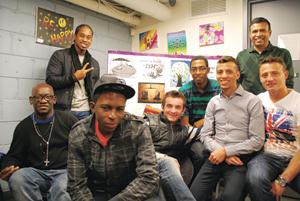The rooftop is a bit chilly these days at AccessPoint on Danforth. But during the summer, this east-end community hub of Access Alliance boasts a lush community garden and a big rooftop Pride party.
The multicultural health and community services organization takes the gay liberation slogan “We are everywhere” seriously, offering settlement services, group programs and relevant resources to queer people throughout the city. Field trips and a monthly drop-in night for queer newcomers are popular, and a queer gardening group has made use of AccessPoint’s collectively tended garden to let east-enders try out their green thumbs. Many who participate come from outside the downtown core — and many say they benefit from Access Alliance’s queer-positive, anti-racist approach to social services beyond the bubble.
“We know LGBTQ newcomers live everywhere in the city, not just downtown,” says Aamer Esmail, a programs manager at Access Alliance. Since 2009, Esmail has helped coordinate the Among Friends Initiative — a collaboration between Access Alliance, the 519 Church Street Community Centre and CultureLink that educates service providers on the specific challenges facing queer newcomers to Canada. What makes Among Friends remarkable is its reliance on the leadership of queer newcomers as facilitators and educators. Among Friends volunteers have used their experiences training service providers to help offer better support for queer newcomers. Ranjith Kulatilake and Venezia Zuniga — both former Among Friends facilitators — are now peer facilitators at Access Alliance’s monthly drop-ins.
Kulatilake, Zuniga and Esmail all say queer newcomers often face homophobia that doesn’t square with the downtown bubble’s gay-friendly image.
“A lot of people are coming to Toronto thinking, ‘This is a haven,’” Esmail says. “And then they come and they realize, yes, you have legalized marriage, but it’s not necessarily the same in every neighbourhood. It’s not always the same feeling as Church Street.”
Meanwhile, increasingly conservative immigration policies and everyday forms of racism — including in queer communities — make the need for queer-friendly and antiracist spaces and services all the more urgent. “When you’re new and you’re coming in, you think there’s a certain way to express your queerness that you must follow,” Esmail says. Initiatives for and by queer newcomers and queer people of colour, he says, tell a different story: “Talk the way you talk, look the way you look, and that is still queer and still Canadian, and you can be validated for exactly who you are.”
Zuniga says that Among Friends was a lifeline after she arrived in Canada from Mexico. “Volunteering with Among Friends helped me to strengthen my English communication skills, to share what I’ve gone through and the challenges I’ve faced,” she says. “I feel like it’s important for me to keep giving back.”
Kulatilake, who immigrated to Toronto from Sri Lanka, also emphasizes the importance of creating a space for newcomers where they can share stories with one another. “It seemed as if that little room we shared was the only space safe from racist and homophobic insinuations and attacks,” he says. “At Among Friends, finally I felt that I belonged.”
At a recent drop-in, Kulatilake led participants in a frank discussion. While they enjoyed pizza and juice, he introduced a new game, Fears in a Hat. He distributed paper and asked each person to write down a fear. Kulatilake collected the fears in a hat, then participants took turns reading them to the group. Fears ranged from the mundane (dogs) to the quirky (turtles) to the cruel: physical attacks, losing an apartment, deportation and political violence back home.
Clearly, some fears are part of being human. But others stem from structural problems — racism, xenophobia, homophobia, transphobia and economic inequality. Kulatilake says no organization can undo these problems, but in everyday and powerful ways, Access Alliance is creating space for people whose lives are affected by terrifying forms of injustice to connect, to build community, to share food and ideas, to get to know the city, to learn about health and to make life more livable.
What’s more, the organization does this work in important and underserved corners and communities in the city — working toward a Toronto, as Esmail puts it, where “all spaces are positive spaces, for all of us.”
For more information, go to the website, accessalliance.ca.

 Why you can trust Xtra
Why you can trust Xtra


